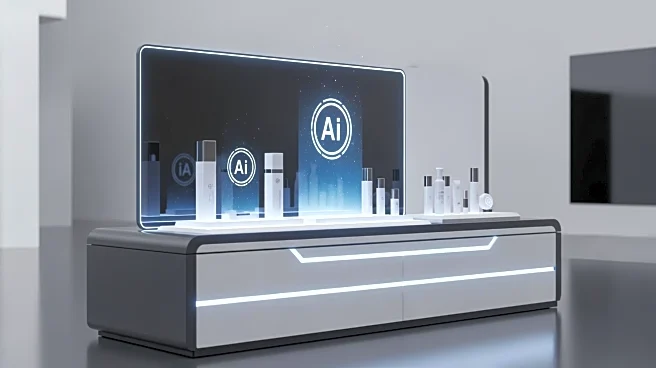What's Happening?
Coresight Research has released a report detailing significant changes in the U.S. beauty retail sector, emphasizing a shift from traditional channel-first strategies to intent-first retailing. This evolution is driven by consumer demand for hyper-personalization,
AI-driven diagnostics, and biologically rooted formulations. The report, authored by Madhav Pitaliya, highlights how personalization has become a baseline standard in the industry, necessitating manufacturers and suppliers to rethink their R&D and production frameworks. Companies like L’Oréal, Estée Lauder, and Unilever are adopting modular systems for micro-batching and real-time customization based on biometric data. AI and biotechnology are identified as key drivers of innovation, impacting formulation, manufacturing, supply chain, and consumer engagement.
Why It's Important?
The shift towards personalization and AI integration in beauty retailing is reshaping the industry, offering new opportunities for brands to enhance consumer engagement and streamline operations. This trend is significant as it aligns with broader consumer preferences for wellness and longevity, redefining efficacy standards and ingredient claims. The integration of AI and biotechnology not only accelerates R&D but also enables sustainable and high-performance actives, fostering cross-disciplinary partnerships. As indie brands gain ground with niche positioning and creator-driven marketing, larger manufacturers are investing in digital tools and modular R&D systems to maintain agility and relevance. The report also notes geopolitical uncertainties and tariff volatility as factors driving manufacturing diversification, highlighting the importance of multi-hub production models and local ingredient sourcing.
What's Next?
As the beauty industry continues to evolve, brands are expected to further integrate AI-driven diagnostics and loyalty-linked personalization to bridge the gap between online and in-store experiences. Retailers like Sephora and Ulta Beauty are already leading in this integration. The competitive pressure from indie brands will likely push larger manufacturers to continue investing in innovation pipelines, including AI, biotech, and diagnostics start-ups. Additionally, geopolitical uncertainties may prompt further diversification in manufacturing strategies, with an emphasis on regional expansions and local ingredient production through biotechnology. These developments will require brands to enhance scenario planning and risk mitigation strategies to navigate future disruptions.
Beyond the Headlines
The shift towards intent-first retailing and personalization in beauty is not just a trend but a fundamental change in consumer behavior and industry operations. This evolution reflects a broader cultural shift towards wellness and longevity, where beauty products are seen as both therapeutic and preventive. The emphasis on biologically validated ingredients and measurable outcomes signals a move away from traditional user perception claims, potentially redefining industry standards. As brands adapt to these changes, ethical considerations around ingredient sourcing and sustainability will become increasingly important, influencing consumer trust and brand loyalty.















